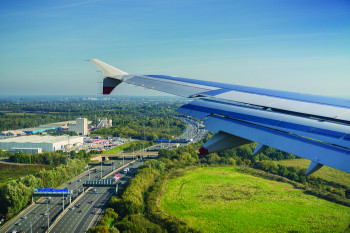City transport bosses have backed the view of the Government’s climate change advisers on how the sector should contribute to cutting net greenhouse gas emissions to zero by 2050.
In a report last week, the Committee on Climate Change (CCC) said a net-zero target for 2050 would deliver on the Paris Agreement and is achievable with known technologies, alongside improvements in people’s lives, and within the economic cost of the existing commitment to an 80% reduction from 1990 levels.

The M25 near Heathrow
It added however that this would only be possible if ‘clear, stable and well-designed policies to reduce emissions further are introduced across the economy without delay,’ adding: ‘Current policy is insufficient for even the existing targets.’
The report states: ‘The UK must make firm plans for housing and domestic heat; for industrial emissions; carbon capture and storage; road transport; agriculture; aviation and shipping.’
Jonathan Bray, director of the Urban Transport Group, which represents city region transport authorities, said: ‘This advice is unequivocal: achieving net zero carbon emissions by the middle of the century is possible and affordable, but national policies must be ramped up to make this target credible.
‘Nowhere is this more apparent than in the transport sector – the single biggest contributor of UK greenhouse gases. The Committee has set out a clear route map for how to tackle transport emissions, from stronger ambition on electric cars and vans, further encouragement of walking, cycling and public transport to avoid car dependency, and a rolling programme of rail electrification – measures we support.’
Mr Bray said it was good to see the committee recognise the key role cities and local authorities play in carbon reduction in their own areas and acknowledge that their efforts to reduce emissions can be hampered by a lack of resources.
He added: ‘The onus is now on Government to give us the framework and funding we need to fully decarbonise urban transport.’
The report recommends that the net-zero 2050 target should include international aviation and shipping and should not rely on international carbon units (or ‘credits’).
Last week the High Court rejected claims that the Government had acted unlawfully in allowing the expansion of Heathrow airport by not taking into account the Paris Agreement.
The judges pointed out that the agreement ‘does not form part of UK law and so, while the UK has ratified it, until Parliament decides if and how to incorporate the Paris Agreement target, it has no effect in domestic law’.
In its report, the CCC said the net-zero target ‘could involve…more limited aviation demand growth’, adding that industries like aviation that have not reduced emissions to zero might have to pay the costs – up to £20bn annually by 2050 – of removing emissions from the atmosphere, which ‘would imply increasing costs (e.g. for flights) from 2035’.
The report states: ‘We will write to the Government later this year on its approach to aviation, building on the advice in this report.’
Register now for full access
Register just once to get unrestricted, real-time coverage of the issues and challenges facing UK transport and highways engineers.
Full website content includes the latest news, exclusive commentary from leading industry figures and detailed topical analysis of the highways, transportation, environment and place-shaping sectors.
Use the link below to register your details for full, free access.
Already a registered? Login